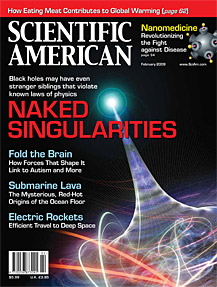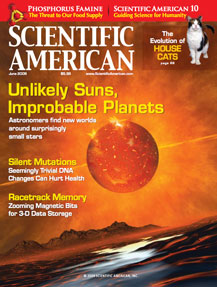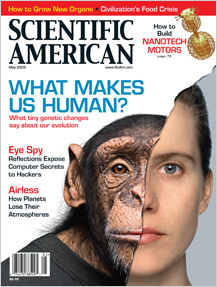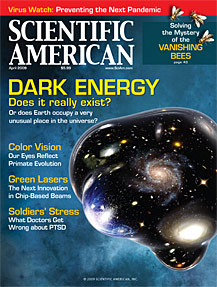June 1, 2009
Why people believe that invisible agents
control the world
Souls, spirits, ghosts, gods, demons, angels, aliens, intelligent designers, government conspirators, and all manner of invisible agents with power and intention are believed to haunt our world and control our lives. Why?
The answer has two parts, starting with the concept of “patternicity,” which I defined in my December 2008 column as the human tendency to find meaningful patterns in meaningless noise. Consider the face on Mars, the Virgin Mary on a grilled-cheese sandwich, satanic messages in rock music. Of course, some patterns are real. Finding predictive patterns in changing weather, fruiting trees, migrating prey animals and hungry predators was central to the survival of Paleolithic hominids. (continue reading…)
May 1, 2009
A skeptic engages three types of creationists who claim science supports their beliefs, yet they contradict one another
During the tsunami of bicentennial celebrations of Charles Darwin’s 200th birthday in February, I visited the fringes of evolutionary skepticism to better understand how one of science’s grandest theories could still be doubted.
Noah’s Ark Zoo Farm in Bristol, England, is run by a kindly gentlemen named Anthony Bush, who insisted that I not confuse him with those “loony American creationists” who think that Earth is only 6,000 years old. “How old do you think it is?” I queried. “Oh, I’ve worked it out to be around 100,000 years old, with Adam and Eve at around 21,000 years old.” (At an order of magnitude difference that makes Mr. Bush only five zeros shy of reality.)
What about, I pressed on, all the geologic evidence for a much older Earth? All those strata of, say, sandstone — loose sand compressed into solid rock over immense periods? Those strata are laid down every season, like tree rings, Bush explained. Interesting analogy, given that we can see trees growing from year to year, but where can we find sand being annually compressed into stone? (continue reading…)
April 1, 2009
Are successful people primarily the beneficiaries of luck, timing and cultural legacy?
What is the difference between Joe Six-Pack, Joe the Plumber and Joe Biden? One is vice president, and the other two are not. Why? The answer depends on a host of interactive variables that must be factored into any equation of success: genes, parents, siblings, peers, mentors, practice, drive, culture, timing, legacy and luck. The rub for the scientist is determining the percentage of influence of each variable and its interactions, which requires the use of sophisticated statistical models.
Journalists unconstrained by research protocols churn out selfhelp books that focus on select variables that interest them. Few do so better than Malcolm Gladwell, and in his new book Outliers: The Story of Success (Little, Brown, 2008), the New Yorker writer claims that successful people are not “self-made” but instead “are invariably the beneficiaries of hidden advantages and extraordinary opportunities and cultural legacies that allow them to learn and work hard and make sense of the world in ways others cannot.” (continue reading…)
March 1, 2009
How we can avoid falling prey to con men such as Bernard Madoff
On a Los Angeles street corner in 2000, I was the “inside man” in a classic con game called the pigeon drop. A magician named Dan Harlan orchestrated it for a television series I cohosted called Exploring the Unknown (type “Shermer, con games” into Google). Our pigeon was a man from whom I asked directions to the local hospital while Dan (the “outside man”) moved in and appeared to find a wallet full of cash on the ground. After it was established that the wallet belonged to neither of us and appeared to have about $3,000 in it, Dan announced that we should split the money three ways. (continue reading…)
February 1, 2009
On the 200th anniversary of Charles Darwin’s birthday two myths persist about evolution and natural selection

On July 2, 1866, Alfred Russel Wallace, the co-discoverer of natural selection, wrote to Charles Darwin to lament how he had been “so repeatedly struck by the utter inability of numbers of intelligent persons to see clearly or at all, the self acting & necessary effects of Nat Selection, that I am led to conclude that the term itself & your mode of illustrating it, however clear & beautiful to many of us are yet not the best adapted to impress it on the general naturalist public.” The source of the misunderstanding, Wallace continued, was the name itself, in that it implies “the constant watching of an intelligent ‘chooser’ like man’s selection to which you so often compare it,” and that “thought and direction are essential to the action of ‘Natural Selection.’” Wallace suggested redacting the term and adopting Herbert Spencer’s phrase “survival of the fittest.” (continue reading…)






